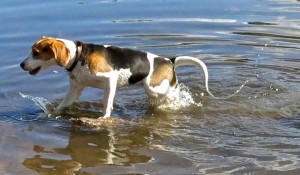Should I Let My Dog Swim in the Winter?
Dogs are full of fun and energy, no matter what time of year it is. Even during a winter visit to a beach, or lake – many a hardy pooch won’t be the least bit put off by a bit of cold water paddling – or even swimming. Is this safe, though? How cold, is too cold when it comes to winter swimming for dogs? Holidays4Dogs gives this chilly question some thought.
Depending on the sort of dog you own, it’s important to consider the consequences of winter swimming for dogs. Dogs don’t understand their limitations and while some breeds are excellent swimmers, other dogs are not so good and need careful supervision at any time of the year. Pugs and bulldogs, for instance, are not natural swimmers and, because of their short faces, can find breathing difficult.
Autumn and winter swimming is fine for fit and healthy dogs with good stores of body fat and an adequate covering of fur.
However, for puppies, senior dogs and certain breeds, getting too cold by being submerged in water can be dangerous.
Water safety.
 Indeed, the amount of time a dog is immersed in cold water is an important factor to consider. A quick splash in the sea, or a fleeting dip in a lake, is not the same as prolonged exposure to freezing water. That said, a toy dog falling into freezing water, for example, could cause fatal shock.
Indeed, the amount of time a dog is immersed in cold water is an important factor to consider. A quick splash in the sea, or a fleeting dip in a lake, is not the same as prolonged exposure to freezing water. That said, a toy dog falling into freezing water, for example, could cause fatal shock.
We are also assuming the condition of the water is relatively safe, i.e. free from algae, pollution and debris. Rivers can be very hazardous, even in the warmer months. However, in autumn and winter, rivers can become dangerously high – often very quickly.
As a result, this increases the risk of strong undercurrents, floating hazards and pollution. Therefore, it is best not to encourage river swimming during the winter months. In addition, be very careful around rivers, even in more favourable weather conditions.
What are the dangers of winter swimming for dogs?
Long periods in cold water can cause a dog to develop hypothermia, as well as more minor conditions such as swimmers tail. Hypothermia can be life threatening, so never let your dog spend an excessive time in winter temperature water.
If your dog does swim, make sure you have plenty of towels to dry him off. Put him in a warm car, or room, as soon as you can after he gets out. If your dogs get soaking wet in winter he, or she, can chill very quickly.
It can be dangerous for toy dogs to access icy water, as they are much more susceptible to hypothermia. Cold water swimming is not advisable for elderly dogs, puppies and those with health conditions. Likewise, any dog with ‘thin’ fur, like whippets, should also keep out of winter water.
Also, it may seem obvious, but make sure your dog can actually swim before you allow him near water in the winter. Swimming is a skill many dogs may need time to learn and this is best done in the summer months.
Conclusion
Many dogs enjoy a quick dip at any time of the year, with wintertime no exception. However, do make sure you are aware of your dog’s capabilities and limitations. The ideal time for dogs to enjoy swimming is during warm weather when they can enjoy keeping cool and dry rapidly.
Winter swimming can be fun for fit and healthy dogs, but it is always very important to make sure your dog is not in cold water for too long. Always make sure you can dry your dog off quickly.
Swimming in general is fabulous exercise for dogs. It is low-impact and so good for dogs with mobility issues, or dogs recovering from injury or surgery.
However, in these cases, you should take your dog to a dedicated canine hydrotherapy pool, where your dog will be supervised by expert staff.
If you want to know how to keep your dog clean over the winter months – head over to our other Holidays4Dogs article for hints and tips.


